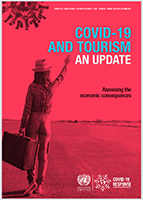The COVID-19 pandemic has been a health and economic crisis with devastating effects on developing countries, especially those dependent on tourism. As governments have attempted to protect their populations, lockdowns, quarantines, and major restrictions on national and international mobility were implemented.
This, coupled with the decision of consumers to limit international travel resulted in a sharp contraction for the tourism sector with severe economic consequences, particularly on countries that rely on the sector.
The number of international tourist arrivals declined by 74% in 2020 compared with the previous year (UNWTO Tourism Dashboard). In many developing countries, arrivals were down by 80-90%.
The beginning of the year 2021 has been worse for most destinations, with an average global decline of 88% compared with pre-pandemic levels, although the northern summer and autumn may see a significant improvement for some destinations, in particular for domestic and regional travel.
The indirect effects of this decline are even more devastating, as labour and capital remain unused and the lack of demand for intermediate goods and services has a negative upstream effect into many sectors.
This note attempts to quantify these effects and shows how the rollout of vaccines may affect these estimates.

